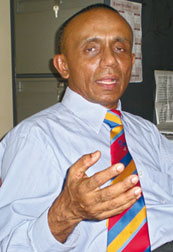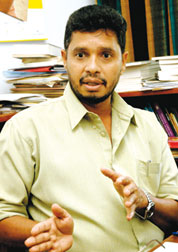|
Mahinda Chinthana:
Vision for the future
Mahinda Chinthana Idiri Dakma (Vision for
the future) was launched last week renewing hopes and aspirations among
Sri Lankan citizens for a brighter future. President Rajapaksa's
national and foreign policies have always been beneficial to the
development of the country. It was due to his far-sighted policy
planning that the country was able to successfully survive the massive
financial crises that hit most of the world economies.
Though huge financial allocations were made
on war, the government could yet maintain a decent GDP growth rate
during the past four years while implementing mega development projects.
The Sunday Observer interviewed Indrajith Aponsu, Senior Lecturer in
Economics of the University of Colombo and Dhamma Dissanayake, Senior
Lecturer Political Science and Public Policy, University of Colombo who
firmly believe that the country will move forward even further during
his next tenure.
By Samangie WETTIMUNY
Excerpts:
The financial crisis which hit the world last year was similar or
even worse than the crises that affected the world in the 30s. World
economies were in shambles. Some of the fast growing economies in Asia
such as Singapore and Malaysia experienced negative growth.
 |
|
Indrajith Aponsu, Senior Lecturer in
Economics,
University of Colombo |
 |
|
Dhamma Dissanayake, Senior Lecturer in
Political Science
and Public Policy, University of Colombo |
However, Sri Lanka managed to record a growth rate which was fairly
decent and also it was good enough to keep the economy from going into
negative growth.
"I would say it is commendable performance when you make a relative
comparison to GDP growth in other countries." says Indrajith Aponsu,
Senior Lecturer in Economics, University of Colombo . He attributes it
largely to the policies of Mahinda Chinthana . "As I see the main reason
is President's decision to create domestic growth through agriculture
and other rural sector developments. It is an ingenious move."
Explaining further, he said that earlier more than 50% contribution
to GDP was from the Western Province. Also Sri Lankan economy (more than
70%) was based on trade. In particular, our export sector was highly
relying on foreign economies such as US and EU. Also we were relying on
sectors like tourism. These were the sectors that were very badly
affected by the global financial crisis.
"It is at this point that President's decision became so much
prominent." "He went into promotion of agriculture in a big way that
really compensated for the losses in the areas which were relying on
foreign sectors, especially the industrial sector. This in a way had
helped keep the GDP growth at a decent level relative to other
countries."
As Senior Lecturer in Political Science and Public policy, Dhamma
Dissanayake sees 'Mahinda Chinthana Vision for the Future' has almost
all the relevant features of a successful manifesto. Though many
politicians have the habit of presenting their manifestos before an
election , they lack many of the salient features. It seems that they
have not paid enough attention to the standard or quality of it.
" In the history we have had only a very few manifestos which were up
to the required standard. For example, the manifesto which was presented
by Lanka Sama Samaja Party in 1935, manifestos which were presented by
former Prime Minister, S.W.R.D. Bandaranaike and by Samagi Peramuna
respectively in 1956 and 1970 were much talked of as they were up to the
standard. Since then it was President Mahinda Rajapaksa who could come
out with a manifesto based on solid background."
As he further noted manifestos which carry mere promises are poor in
quality. A manifesto should be always based on solid fundamental,
conceptual and theoretical values."A fine example was People's Agenda
presented by U.N.P. in 2004. However their present manifesto remains to
be a mere set of promises and it is a pity that the rival party could
not come out with a sound manifesto."
On the contrary the two manifestos presented by this government have
clearly indicated their targets and also the ways and means of achieving
them." It clearly states how the country should go forward while
attracting other favourable international sources.
Maga Naguma
Indrajith Aponsu too held almost a similar view. He said that there
is enormous potential for further development. "Maga Naguma" is a
far-sighted program. As he said one of the major bottlenecks Sri Lanka
has been facing throughout last several decades was the inability to
connect up regions.
"It did not address the major issue of connecting up regions,
connecting up provinces with the hub of the economy." If we are to
attract more investors and if we want our investors to go out, we have
to develop infrastructure-especially the roads. But it is always better
to have a proper way to address the peripheral issues that may a rise."
As an economist Aponsu is certain that once the Hambantota Port is
completed it will certainly bring immense economic benefits to the
country.
"Plantation and garment sectors have always played a major role in
our economy and these sectors had been major foreign exchange earners.
But now it is time to look into more profitable avenues - it is of
utmost necessity to create a mega sector that would pave the way for the
emergence of new sectors.
"I think port development will be much bigger than any other sector
we had. For the simple reason the geographical location of Sri Lanka.
Its location has tremendous advantages both economically and
geographically and even politically. It is very strange that none of our
successive leaders ever realized the necessity of constructing a harbour.
I am sure this will be a major service sector."
Hambantota harbour will pave the way for open-ended development.
Today the country is politically, economically and democratically
stable and there is no doubt that the harbour will always be the hub of
international attention. As he further noted the sector itself will be a
highly value added sector. It will create a whole chain of economic
affairs within the country. And also because Sri Lanka is an island
nation, the harbour will create the potential for other sub ports to
develop centering around mega ports. So this is going to create a major
navigational hub. "Perhaps I'd imagine that we'd be a major competitor
to one of the major shipping hubs in Asia-Singapore.
When asked about the low interest rates and its impact on investment
Aponsu said that low interest rates in banks do not necessarily
guarantee higher investment. Higher investment requires other factors
such as environment, the future profitability and market opportunities.
"And I think low interest rates supported by political stability,
clear economic vision without the major bottleneck, the war, will
definitely create a very conducive environment to investments."
Share market reflects the investor confidence in a certain day.
People do not walk into a share market if the share market is not going
to perform well and the market performance is based on profitability of
companies."
That the share market is doing extremely well, may be one of the best
markets in the world-reflects the contrary to what some people argue.
With the end of war the country will now attract foreign investors for a
number of reasons. "Also it is not that investors are just coming here
to make a profit and go away, but they will blend themselves into our
culture. They will also want to have their people working here.
I am sure this country offers a lot."
As Dr. Aponsu noted with the North East expansion and other potential
expansion priorities and linkages - we are establishing links with the
rest of the world - investors are really lining up to get into this
country.
Infrastructure development programs such as Uthuru Wasanthaya and
Nagenahira Navodaya are far sighted projects that would help uplift the
living conditions of people in the North and the East. "They of course
need a change."
"I can comment on economic development in many perspectives. I think
we have had in the first few years one of the finest economic growth
performances in the history of Sri Lanka. Second, as stated earlier when
the whole world was crumbling, we were able to maintain the economic
growth within the ratio of 3-4% which I think is extremely commendable."
Industrial sector is one of the areas that could really pave the way
for huge employment generation, high level income value addition, high
sustainability and faster growth momentum. So there is no possibility
that we can generate something in the short term and the medium term,
unless we refocus on industrial sector and look for some viable industry
which will complement and supplement the garment and other sectors.
As Aponsu sees in this particular four years, the way we have reached
the grass roots level has made the income distribution far more even and
widespread.
Foreign policy
As Dhamma Dissanayake says only two Sri Lankan leaders had so far
been able to handle Sri Lanka's foreign policy independently without
succumbing unnecessarily to international forces . First was former
Prime Minister Sirimavo Bandaranaike and the second is none other than
President Mahinda Rajapaksa. He has always been able to maintain the
image and dignity of the country.
As mentioned earlier his emphasis on national economy helped Sri
Lanka to face global financial crisis successfully.
Why should we reelect him as President.?
"Is it solely as a gesture of gratitude that we should reelect
Mahinda Rajapaksa as president. " I asked Dhamma Dissanayake.
" Not necessarily." "If a person wants to cast his/her vote to
Mahinda Rajapaksa as a way of expressing gratitude that is fine, but as
I see that is not the reason why we should vote for him.
His capabilities are far ahead of his chief rival candidate. He
proved his credentials by ending the LTTE terrorism which was ruining
the country for the past thirty years, and also by implementing massive
development projects ranging from agriculture to infrastructure
development. The way he handled international relations is commendable.
He has proved himself to be a clever leader, a democrat at heart who
represents a well-established political party.
|

